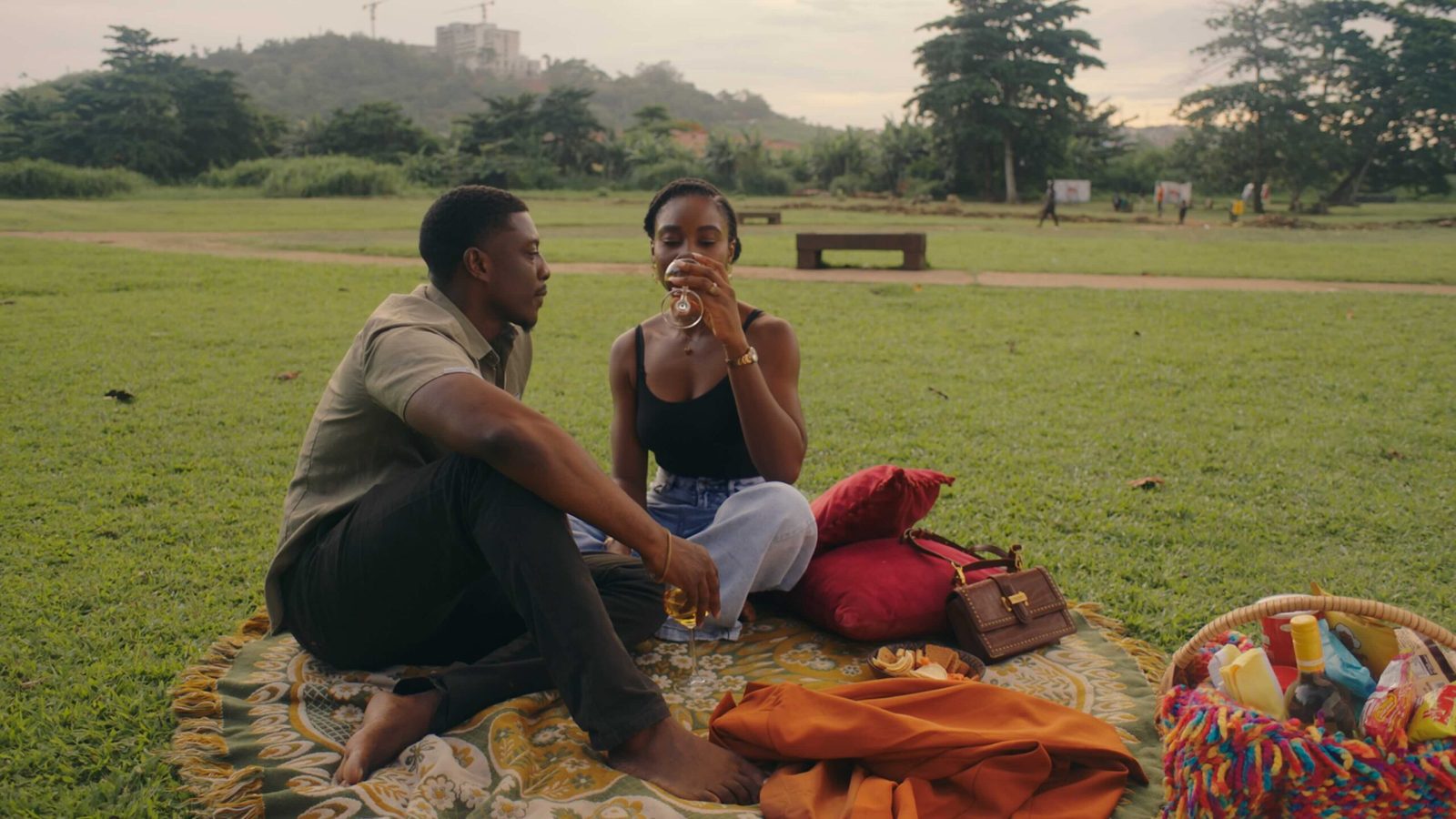The agenda is clearly female autonomy. Zikoko Life goes beyond acknowledging women’s vulnerabilities and struggles, to normalising female agency and championing female happiness.
By Vivian Nneka Nwajiaku
Should films have sociopolitical agendas? That is a debate that may never be truly settled. But whichever side of the coin one lands on, one can at least admit respect for a film that pursues its agenda without hesitation, especially when it defies societal norms and expectations. Zikoko Life (2025) is that kind of work, an assertive, unflinching anthology film series that takes on love and its many complications, all through the female gaze.
Inspired by the famous Zikoko editorial franchises, Naira Life, Sex Life, and Love Life, Zikoko Life comprises three short films created by Anita E. Eboigbe for Big Cabal Media and produced by Blessing Uzzi (A Quiet Monday (2023); I hate it Here (2023); Freedom Way (2024)), doubling as showrunner, for BluHouse Studios. What’s Left of Us addresses marriage; Something Sweet explores age dynamics in romantic relationships; and My Body, God’s Temple digs into sex and intimacy.
The more obvious common thread is love, complicated by religious and societal demands. But the agenda is clearly female autonomy. Zikoko Life goes beyond acknowledging women’s vulnerabilities and struggles, to normalising female agency and championing female happiness, or at least the search for it, with four burgeoning directors who don’t feel the need to twist their female characters into compliance with society’s preferences.
What’s Left of Us
In What’s Left of Us, the first Zikoko Life release, a young Muslim couple go to war on the subject of children. Tolu Asanu plays Mariam, a married woman fighting to reclaim her agency in a society that’s set up to deprive her of it. Her husband, Aliyu (Caleb Richards), wants a house full of children. And he can afford to provide financially for as many children as he wants. But what about what Mariam wants? How much do her choices matter?
It’s almost fascinating how contradictory their wants are, how what’s enough for her isn’t enough for him, and what’s enough for him isn’t enough for her. Writer-director Victor Daniel writes in two children, male and female, for good measure, practically avoiding the contentious issue of family continuity.
But while two is already an overwhelming figure for Maria,m who previously left behind her personal hopes and dreams in exchange for motherhood and now wants more out of life, it’s certainly not enough for Aliyu who is content with the status quo and simply cannot see his wife beyond what he considers to be her role in his life.
Even more interesting is the fact that Mariam’s life starts to fall apart not when her husband becomes unfaithful, but when he finds her birth control pills. That she has to hide them in the first place speaks to her understanding of the world she lives in and the expectations that both her husband and society have of her, with no regard for her own choices.
With the couple’s marriage on the front burner, and a brief subplot around infidelity (featuring a woman named Fatima, played by Joy Sunday), What’s Left of Us challenges gendered expectations in marriage and sexual relationships, tackling questions of bodily autonomy, reproductive health, and financial abuse, while interrogating the role that religious and societal expectations play in depriving women of agency and ensuring their dependence on men.

Asanu puts in a strong shift in portraying a woman who has resolved to seek out her own happiness while recognising the realities of wifehood in a society that insists on female sacrifice but undervalues it. For Richards, whose swoonworthy turn as a yearner in Beyond the Veil (2022) makes it nearly inconceivable to picture him as anything else, his mere charm stands in sharp contrast with the obstinacy that his character exhibits. And it works perfectly, hindered only by his slight difficulty with his character’s Northern accent.
Daniel and co-director, Olamide Adio, take a mostly restrained—sometimes overly restrained—approach to the heaviness of their film’s themes, from marital strife to the hunger for self-realisation. The directors have cited Hollywood’s Revolutionary Road (2008) and Marriage Story (2019) as references, and the influences are clear in the initial fragilities and conflict points that the What’s Left of Us couple tiptoe around, but especially when the conflict reaches its climax.
When the final thread holding their marriage snaps, and Mariam and Aliyu expectedly break into a heated confrontation while Mariam arranges a meal, it’s not difficult to remember Leonardo DiCaprio and Kate Winslet’s acting-class-material sparring, or Scarlett Johansson and Adam Driver’s unforgettably devastating fight.
But Daniel and Adio maintain their film’s restraint, conscious of the fundamentally different dynamics that underlie a Western world marriage and a Nigerian Muslim marriage. And more, they set the confrontation squarely in the world of the woman whose story is being told, both in and out of the film. Mariam may be fighting for her autonomy, but even then, she is still subject to gendered expectations, still bound by the rules she’s been socialised to obey.
Something Sweet
If What’s Left of Us highlights love’s pains, Dika Ofoma’s Something Sweet highlights love’s joys. Judge this book by its cover and take the title at face value; the second Zikoko Life film is literally something sweet. The kind of sweet to be expected when one clicks play on a young adult romance. Except, Something Sweet is not a YA love story. Instead, Ofoma (A Japa Tale (2023); A Quiet Monday (2023); God’s Wife (2024)) writes and directs an age-gap hetero romance where the older half of the couple is the woman.
No, it’s not a conventional relationship in Nigerian society, and no, this is not the first gender-flipped age gap romance in Nigerian cinema. And yet, Something Sweet stands out for the same reason the other Zikoko Life films do: the female gaze.
Where Nollywood typically needs to prioritise gender and shrink its older women to a point where they surrender their autonomy to their younger male partners, or to frame its older women as sexually deviant cougars who completely emasculate their younger male lovers, Something Sweet allows its lovers to just be lovers.
In fact, Something Sweet is a romance drama that just happens to feature an age-gap couple. Twenty-eight-year-old Leke (Ogranya Jable Osai) is a tech bro picking up an outfit for his mother (Tolu Odewumi) when the storeowner, forty-something-year-old Ziora (Michelle Dede), walks out into the reception.

For Leke, it’s love at first sight, a sealed deal from the get-go. On the spot, he conjures up a sensible reason to see her again. They spend time together, building familiarity over a montage. But it’s in the moments after, when the initial excuse has become played out and the montage is in the rearview mirror, that the romance really kicks in, disarming, warm, and cosy.
It’s not that Ofoma’s characters are oblivious to the unusualness of their relationship. Ziora, the mother of a young adult son (Oladozie Olawaiye), is hesitant at first, but as a woman who has already established her own agency prior to meeting Leke, all it takes is for her to recognise his. It’s a new experience for Leke, too, and he sometimes finds himself defending his ego to outsiders. But they navigate the power dynamics of age and gender, and the awkwardness of it, with remarkable maturity and incredible chemistry.
Dede was made for this role, and the camera captures her like a lover would. But she is also a natural at finding that balance between sweetness and firmness, and between youthful excitement and the experience that comes with age. Osai is soft-spoken (to the point of inaudibility) but boyishly confident, and he plays Leke with the easy gait of a man who is certain of his goal, the eyes of a lover, and the carriage of a person terrified of not having their love requited.
In just under thirty minutes, Something Sweet approaches the romance genre with more interest in romance than most Nollywood romance features of recent times. It even rounds out its exploration of the genre with a declaration of love that would not be inadequate in a regency era drama (with adjustments to language, of course). This is solid comfort food, but it still very much invites the audience to question their biases and broaden their palettes.
My Body, God’s Temple
The final entry in the Zikoko Life anthology is My Body, God’s Temple, a sometimes humorous yet effective dive into female pleasure, through the tale of a newly-wed couple struggling with sex. It’s an essential representation in a society that is pretentious about sex and particularly condemnatory of female sexuality. But more importantly, it is a truthful, judgment-free, and even “edutaining” portrayal in a time where conversations on purity culture tend to be extreme on either side of the debate.
Writer-director Uzoamaka Power (formerly Uzoamaka Aniunoh) stars as Omasilu, a Catholic bride who has “kept herself for marriage” in accordance with the dictates of her religion. Now that she is married to the patient but very human Zion (Andrew Yaw Bunting), her body seems shy on her behalf, and she is in her head about it, and it is putting an early strain on their new marriage. “Maybe it’s something about referring to my body as God’s temple for so long”, she tells Zion.
It is a challenge for both of them, but the focus is on Omasilu. In confrontations, the camera typically moves back and forth between the couple, but for most of the film, when they’re together, the camera stays trained on Omasilu, with Zion coming into the frame. It’s such an effective directorial choice that feeds into the Zikoko Life goal of centring women in their stories. This is primarily her journey. She must first learn her own body, and she must overcome the shame, fear, and silence that she has been conditioned to associate with sex and intimacy.

As a by-product of the POV, we hear about the couple’s challenges more than we see them—which can be alienating—and there is more interest in reactions to situations than in actual situations. Yet, that may very well be a necessary evil, considering the effectiveness of the POV and the film’s emphasis on communication in relationships.
Besides, the performances smooth out some of the rough edges. Power expectedly puts on a grand performance as a repressed young woman trying hard to act normal about sex when she is in fact not normal about sex. And Bunting is an undeniable heartthrob destined for a career as a charming romance lead (if Nollywood’s casting directors are paying attention).
It’s a plus that they are gorgeous actors, like the other Zikoko Life leads. The entire anthology just looks stunning, from the beautiful cast to the striking production. This is an enjoyable anthology with admirable vision and the potential for social engineering. At the risk of invoking the sequel curse, there is no reason that this delightful project should end here.
Rating: 4/5
* Zikoko Life is streaming on YouTube.
Vivian Nneka Nwajiaku is a writer, film critic, TV lover, and occasional storyteller writing from Lagos. She has a master’s degree in law but spends most of her time watching, reading about and discussing films and TV shows. She’s particularly concerned about what art has to say about society’s relationship with women. Connect with her on X @Nneka_Viv



